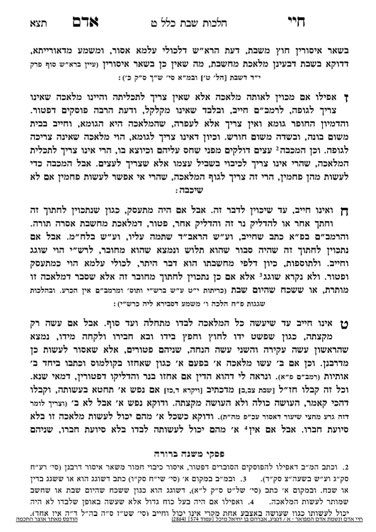We are beginning siman 9, where the Chayei Adam discusses the concept of performance of a full melacha versus performance of a partial melacha. One application of this concept is when a melacha has multiple steps to its performance, and those steps are spread out amongst different people. None of those people are chayav mideoraysa, because they did not perform a complete melacha. Another application is when two people perform the melacha together
The Chayei Adam writes that a person is not chayav mideoraysa until they perform the melacha and all of its steps by themselves.
The Chayei Adam gives an example of performing only part of a melacha. The melacha of hotza’ah has multiple steps to it. It begins in a state of rest, gets uprooted (akira), is transferred from reshus hayachid to reshus harabbim, and then placed down in reshus harabbim (hanacha). The melacha is not the carrying, per se, but changing the state of being of the item from being an “inside item” to an “outside item”. As long as the person is moving with the item while they are in the reshus harabbim, they are not chayav, because they have not completed the melacha process. One is only chayav when they stop walking (we hold that the person stopping is akin to the object being put down, known as hanachas haguf ke’hanachas cheifetz).
Theoretically, if one person performs the akira, and then transfers it to another person and the second person performs the hanacha, neither have performed all of the steps of the melacha, so they are both patur mideoraysa. The Chayei Adam gives an example of one who sits in his home and sticks his hand out the window with an object and another person takes it. Neither is chayav mideoraysa because neither performed a complete melacha.
Nevertheless, it is assur miderabanan to carry in this manner. This halacha becomes relevant when a person is outside with an item which cannot be left outside, such as a child, and finds out the eruv is down. In such a situation, we will allow individuals to not perform a complete melacha in order to bring the item inside.
We will discuss another example in the upcoming shiur, be’ezras Hashem.
Summary
One is only chayav mideoraysa for performing a complete melacha. If one does not complete the entire melacha, or splits it with another person, they are not chayav mideoraysa. Nevertheless, it is assur miderabanan.



